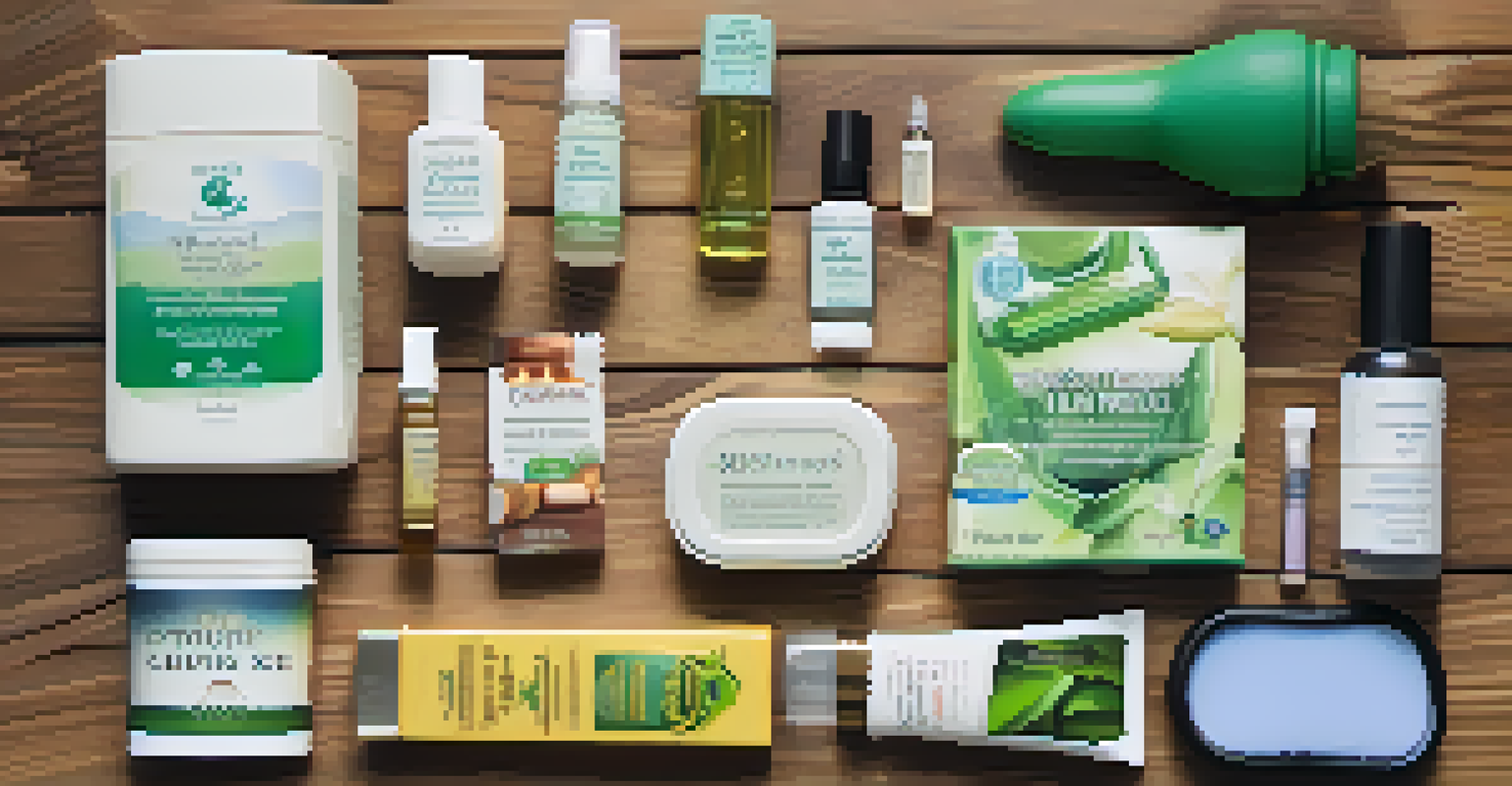How to Stay Safe from Insect Bites While Traveling

Understanding Common Insect Bites and Risks
When traveling, it’s essential to understand the types of insects that may pose a risk. Common culprits include mosquitoes, ticks, and sandflies, each carrying potential diseases. For example, mosquitoes can transmit malaria and dengue fever, while ticks can carry Lyme disease.
An ounce of prevention is worth a pound of cure.
Knowing where these insects are prevalent can help you prepare accordingly. For instance, if your adventure takes you to tropical regions, be especially vigilant against mosquitoes. Research the local insect threats and their peak seasons to better prepare yourself.
By being aware of the risks associated with different insects, you can take proactive steps to protect yourself. This knowledge is your first defense against unwanted bites and the dangers they may bring.
Pack the Right Insect Repellent for Your Trip
One of your best allies against insect bites is a good insect repellent. Look for products containing DEET, picaridin, or oil of lemon eucalyptus, as these have been proven effective against a range of biting insects. Always check the concentration levels; higher percentages offer longer protection.

When choosing a repellent, consider the duration of your outdoor activities. If you’re planning an all-day hike, opt for a stronger formulation. Conversely, if you’re just stepping out for a quick stroll, a milder repellent may suffice.
Recognize Insect Bite Risks
Understanding the types of insects and the diseases they carry can help you prepare effectively while traveling.
Remember to apply the repellent according to the instructions. This means reapplying after swimming or excessive sweating to maintain effectiveness. Staying vigilant with your repellent application can greatly reduce your chances of getting bitten.
Wear Appropriate Clothing to Avoid Bites
What you wear can significantly impact your risk of insect bites. Light-colored, long-sleeved shirts and long pants can help protect your skin from hungry insects like mosquitoes and ticks. Dark colors tend to attract more insects, so it's best to stick to lighter hues.
The best way to predict the future is to create it.
Additionally, consider treating your clothing with permethrin, an insect repellent designed for fabrics. This extra layer of defense not only deters insects but also remains effective through several washes. Wearing protective clothing can be a game-changer, especially in high-risk areas.
Don’t forget about your feet and head! Tuck your pants into your socks and wear a hat when trekking through tall grass or wooded areas. These small adjustments can help shield you from bites when you’re most vulnerable.
Stay in Safe Accommodations to Minimize Exposure
Choosing the right place to stay can greatly reduce your exposure to insects. Opt for accommodations that have good reviews regarding cleanliness and pest control. Hotels or lodges that prioritize guest safety often have measures in place to combat insect infestations.
Before settling in, inspect your room for any signs of pests. Check for gaps in windows and doors that might allow insects to enter, and consider using screens if available. A little diligence at the start can save you from a night filled with bites and discomfort.
Use Effective Insect Repellents
Choosing and applying the right insect repellent can significantly reduce your chances of getting bitten.
If you’re camping, set up your tent in a location away from stagnant water and dense vegetation, where mosquitoes are more likely to thrive. By being mindful of your surroundings, you can enjoy your stay without the worry of insect encounters.
Be Mindful of Your Surroundings While Outdoors
When exploring nature, staying aware of your surroundings is crucial. Insect activity tends to increase near standing water or during dusk and dawn, so it’s wise to adjust your plans accordingly. Try to schedule outdoor activities during times when insects are less active.
Additionally, avoid wearing heavily scented lotions or perfumes, as these can attract insects. Instead, stick to unscented personal care products when traveling. This small change can make a big difference in how insects perceive you.
When hiking or walking through grassy areas, stay in the center of the path to avoid brushing against vegetation where ticks might hide. By being mindful of your environment, you can minimize your risk of bites and enjoy the beauty around you.
Know How to Treat Insect Bites if They Occur
Despite your best efforts, you might still end up with an insect bite. Knowing how to treat these bites can help reduce discomfort and prevent further issues. If bitten, wash the area with soap and water to minimize infection risk.
Applying a cold compress can alleviate swelling and itching. Over-the-counter antihistamines or hydrocortisone cream can also provide relief from itching and irritation. Keep an eye on the bite for any signs of infection, such as increased redness or pus.
Stay Informed and Prepared
Researching local insect-borne diseases and having a well-stocked travel health kit can enhance your travel safety.
If you experience severe reactions, such as difficulty breathing or swelling beyond the bite area, seek medical attention immediately. Being informed about bite treatment can empower you to handle minor incidents effectively while traveling.
Keep Your Travel Health Kit Well-Stocked
A well-prepared travel health kit can be a lifesaver when it comes to insect bites. Include essential items like insect repellent, antihistamines, and topical creams for treating bites. Having these on hand ensures you're ready to tackle any bite-related issues that arise.
Consider adding natural remedies as well, such as aloe vera gel or tea tree oil, known for their soothing properties. These can complement traditional treatments and provide added comfort. Customize your kit based on your destination and personal preferences.

Regularly check your kit to ensure everything is in good condition and not past its expiration date. A proactive approach can help you stay safe and enjoy your travels without unnecessary interruptions.
Stay Informed About Local Insect-Borne Diseases
Before traveling, research any insect-borne diseases prevalent in your destination. This knowledge can guide your preventative measures and help you take appropriate vaccinations if necessary. For instance, certain areas may require vaccination against yellow fever or other diseases.
Stay updated on any travel advisories regarding outbreaks in the region you’re visiting. Local health departments or the Centers for Disease Control and Prevention (CDC) often provide valuable information. Understanding the risks allows you to be better prepared.
Finally, consider discussing with your doctor about any additional precautions you might need to take based on your personal health history. Being informed about local health issues can significantly enhance your travel safety and enjoyment.